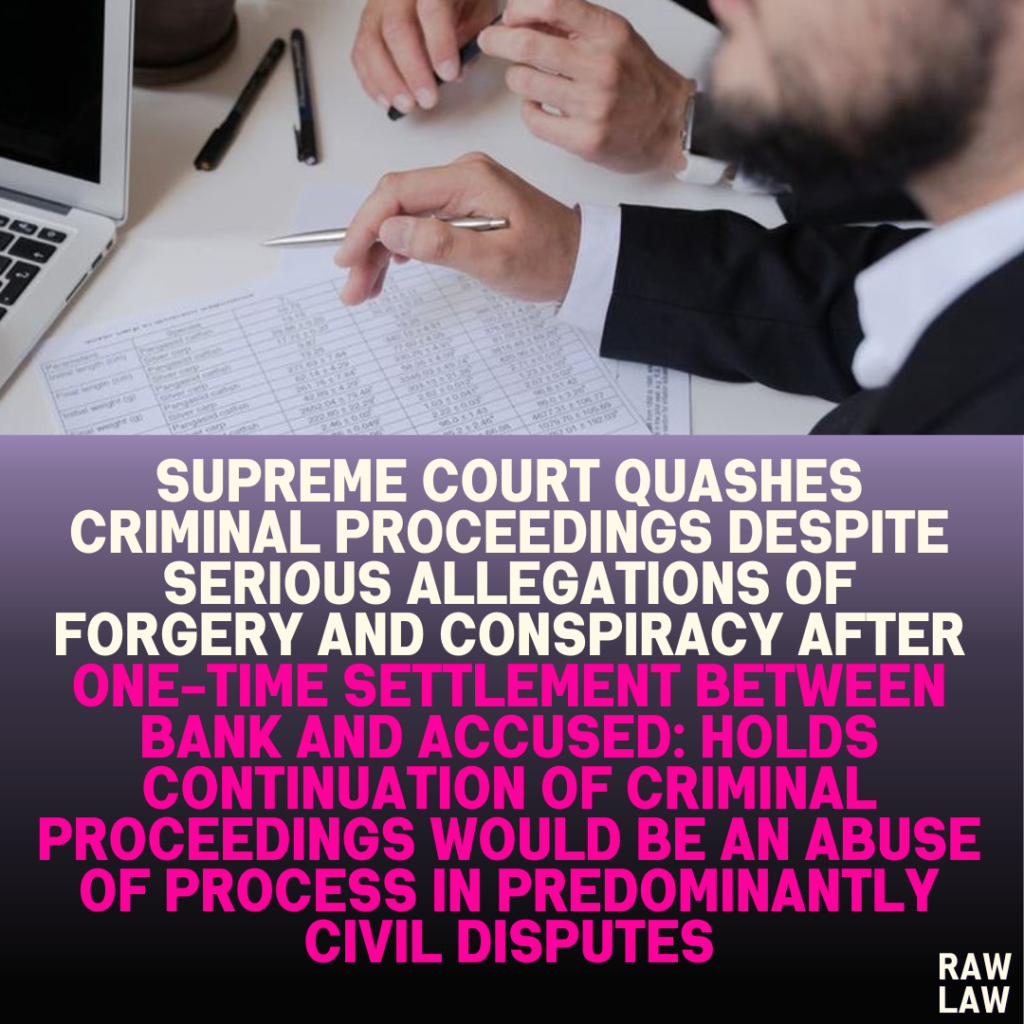Court’s Decision:
The Supreme Court set aside the impugned judgment of the High Court and quashed the criminal proceedings against the appellants. The Court observed that while allegations of forgery and conspiracy were serious, the case involved a commercial transaction dispute that had been amicably resolved through a One-Time Settlement (OTS) with the bank, which rendered the continuation of criminal proceedings oppressive and unjustified.
Facts:
The appellants were part of a group of accused individuals, including the primary accused who was the proprietor of M/s Sirish Traders, a firm engaged in processing Uradh Dhall. Various credit facilities were availed from the Indian Bank, secured by collateral executed by the accused, including the present appellants. Due to non-payment, the group loan account was declared a Non-Performing Asset on 31st March 2010.
Subsequently, during the pendency of a recovery application before the Debts Recovery Tribunal (DRT), it came to light that the title documents submitted as collateral were not original but fake and fabricated. This led to the filing of a written complaint by the bank, resulting in the registration of an FIR by the Central Bureau of Investigation – Economic Offence Wing (CBI-EOW), alleging commission of offenses under the IPC and Prevention of Corruption Act.
Issues:
- Whether the settlement of the dues between the bank and the accused could justify quashing the criminal proceedings, especially in light of the serious allegations of forgery and fraud.
- Whether the continuation of criminal proceedings after the settlement would amount to an abuse of the process of law.
Petitioner’s Arguments:
The appellants argued that they had no active role in the alleged offenses and were dragged into the proceedings solely because of their relationship with the main accused. It was further submitted that the entire loan amount had been settled through an OTS with the bank, which had accepted the amount and closed the loan account, issuing a No Dues Certificate.
They contended that the continuation of criminal proceedings would be a futile exercise, causing unnecessary hardship, given that the primary dispute had been resolved.
Respondent’s Arguments:
The CBI, opposing the plea, argued that the private settlement between the bank and the accused cannot absolve the accused of their criminal liability for serious offenses such as forgery and conspiracy. It was contended that the High Court had rightly refused to quash the criminal proceedings, as these offenses are not merely against the bank but the society at large.
The respondent further emphasized that the quashing of proceedings in such cases would set a dangerous precedent, undermining the criminal justice system.
Analysis of the Law:
The Supreme Court acknowledged the serious nature of the allegations but focused on the nature of the dispute, which primarily involved a commercial transaction. The Court referred to various precedents, emphasizing that where disputes have overwhelmingly civil overtones and have been amicably settled, continuation of criminal proceedings would amount to abuse of the process of law.
In commercial disputes involving financial transactions, if the settlement extinguishes the original cause of action, courts should consider quashing the proceedings to prevent unnecessary oppression.
Precedent Analysis:
The Court referred to earlier decisions in:
- Central Bureau of Investigation, SPE, SIU (X), New Delhi v. Duncans Agro Industries Ltd., Calcutta
- The Court found that a civil dispute was settled and thus, quashed the proceedings.
- Nikhil Merchant v. Central Bureau of Investigation
- This case dealt with a civil dispute having criminal facets. Despite being non-compoundable, the Court quashed the proceedings due to the settlement.
- Gian Singh v. State of Punjab
- This landmark decision distinguished between compoundable and non-compoundable offenses and permitted quashing where civil disputes with criminal elements were settled amicably.
- Narinder Singh v. State of Punjab
- The Court outlined the principles for quashing proceedings in cases with civil nature despite serious allegations.
Court’s Reasoning:
The Court reasoned that in cases where the primary dispute is civil and has been settled between the parties, continuing criminal proceedings would serve no useful purpose. The Supreme Court held that the bank’s decision to accept the settlement and issue a No Dues Certificate indicated that the financial dispute, which was the root of the criminal case, had been resolved. Consequently, the continuation of criminal proceedings would be oppressive and against the interests of justice.
The Court emphasized that the criminal intent behind the submission of fabricated documents, though serious, was subsumed by the civil nature of the dispute and the complete satisfaction of the bank’s claim.
Conclusion:
The Supreme Court allowed the appeal, setting aside the High Court’s order and quashing the criminal proceedings against the appellants. The Court observed that given the civil flavor of the dispute and the settlement reached, no useful purpose would be served by prolonging the litigation.
Implications:
The judgment reaffirms the principle that in cases involving predominantly civil disputes, criminal proceedings can be quashed if the matter is amicably settled. It highlights that courts should prioritize securing the ends of justice over a rigid adherence to legal technicalities, especially when the complainant’s grievances are addressed.
This decision will likely impact how similar disputes involving financial transactions and allegations of forgery are handled, with a greater emphasis on settlements and preventing the misuse of criminal proceedings.



